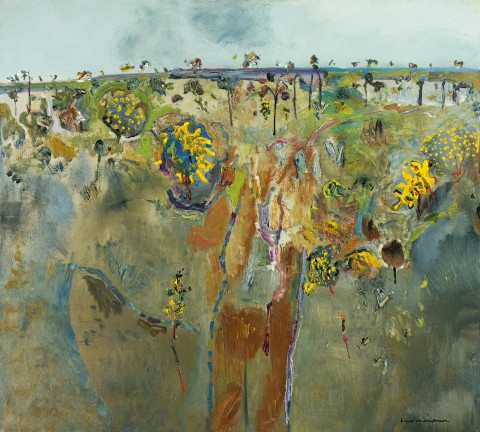ACACIAS, ARTHURS CREEK, 1977
FRED WILLIAMS
oil on canvas
96.0 x 106.5 cm
signed lower right: Fred Williams
signed, dated and inscribed with title on artist’s label verso
bears inscription on stretcher bar verso: 2
Rudy Komon Gallery, Sydney
Private collection, New South Wales, acquired from the above in 1977
Thence by descent
Private collection, New South Wales, acquired from the above in 2004
Acacias, Arthurs Creek, 1977 is a very singular work in Fred Williams’ oeuvre.Rich in all the best we associate with his art, here it is raised to new heights through the interaction of the great landscape traditions of the West and the East as they inspire each other. Williams travelled to China in mid-1976, sketching, viewing, absorbing. Visiting the Imperial Palace, Beijing on 2 June, he noted, ‘a great landscape painting … 300 years old – one of the best landscapes I have ever seen’.1 Williams was impressed by ‘the extraordinary aura that seems to emanate everywhere from a land so suffused with history’.2 Across the scroll-like unrolling of our landscape, seen both in plan and profile, the creek stretches almost from the top to the very bottom of the canvas itself, embracing vestiges of the serpentine rivers recorded in Williams’ China Sketchbook, 1976 (private collection). Now creeks, they plummet waterfall-like in their vertical drop. As Deborah Hart has observed, ’Williams saw that despite the many differences, there were some parallels between Australia and China’.3 She cites the enormous size of both countries and dominance of their landscapes, adding, ‘In both places this implies a meditative spaciousness in which the human hustle and bustle is made relative’.4
The small country town of Arthurs Creek is a short distance northeast of Melbourne, not far from where fellow-artist Clifton Pugh lived at ‘Dunmoochin’, Cottles Bridge. It was at Pugh’s place in 1969 where Williams began painting the golden wattle that first enthralled him in the mid-winter of 1969. Returning to the subject later, he wrote in his diary for 24 July 1974: ‘It was a superb spot and a delight to paint the Wattles in their natural surrounds’.5
Working from his rainbow palette of the time, in Acacias, Arthurs Creek, 1977, Williams provides us with a banquet of paint and colour. Washes are overladen with an abundance of colours and textures – succulent greens, mauves, pinks, browns and most of all, yellows. All herald the golden wattle and nature’s promise of the glory that is spring. Veils and swirls of paint translate into landscape forms or expanses, fields undulate or float, and flats romance verticals as dark-lined tree trunks extend the upward–downward compositional pull – the climbing scene allows both visual ascent and descent. A spill or run of pigment becomes a creek. And all is bathed in an atmosphere both luminous and aqueous as realism and abstraction dwell in harmony.
1. Hart, D., Fred Williams: Infinite Horizons, exhibition catalogue, National Gallery of Australia, Canberra, 2011, p. 151
2. ibid.
3. ibid, p. 154
4. ibid, p. 154
5. The artist quoted in Mollison, J., A Singular Vision: The Art of Fred Williams, exhibition catalogue, Australian National Gallery, Canberra, 1989, p. 175
DAVID THOMAS
